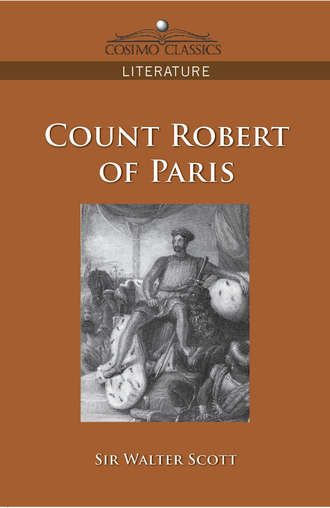
Вальтер Скотт
Count Robert of Paris
"God forbid I should doubt it," said the commander of the battle-axes. "All I mean is to make thee understand, my dear Hereward, that as there are, though perhaps such do not exist in thy dark and gloomy climate, a race of insects which are born in the first rays of the morning, and expire with those of sunset, (thence called by us ephemerae, as enduring one day only,) such is the case of a favourite at court, while enjoying the smiles of the most sacred Emperor. And happy is he whose favour, rising as the person of the sovereign emerges from the level space which extends around the throne, displays itself in the first imperial blaze of glory, and who, keeping his post during the meridian splendour of the crown, has only the fate to disappear and die with the last beam of imperial brightness."
"Your Valour," said the islander, "speaks higher language than my northern wits are able to comprehend. Only, methinks, rather than part with life at the sunset, I would, since insect I must needs be, become a moth for two or three dark hours."
"Such is the sordid desire of the vulgar, Hereward," answered the Follower, with assumed superiority, "who are contented to enjoy life, lacking distinction; whereas we, on the other hand, we of choicer quality, who form the nearest and innermost circle around the Imperial Alexius, in which he himself forms the central point, are watchful, to woman's jealousy, of the distribution of his favours, and omit no opportunity, whether by leaguing with or against each other, to recommend ourselves individually to the peculiar light of his countenance."
"I think I comprehend what you mean," said the guardsman; "although as for living such a life of intrigue – but that matters not."
"It does indeed matter not, my good Hereward," said his officer, "and thou art lucky in having no appetite for the life I have described. Yet have I seen barbarians rise high in the empire, and if they have not altogether the flexibility, the malleability, as it is called – that happy ductility which can give way to circumstances, I have yet known those of barbaric tribes, especially if bred up at court from their youth, who joined to a limited portion of this flexile quality enough of a certain tough durability of temper, which, if it does not excel in availing itself of opportunity, has no contemptible talent at creating it. But letting comparisons pass, it follows, from this emulation of glory, that is, of royal favour, amongst the servants of the imperial and most sacred court, that each is desirous of distinguishing himself by showing to the Emperor, not only that he fully understands the duties of his own employments, but that he is capable, in case of necessity, of discharging those of others."
"I understand," said the Saxon; "and thence it happens that the under ministers, soldiers, and assistants of the great crown-officers, are perpetually engaged, not in aiding each other, but in acting as spies on their neighbours' actions?"
"Even so," answered the commander; "it is but few days since I had a disagreeable instance of it. Every one, however dull in the intellect, hath understood this much, that the great Protospathaire,[10] which title thou knowest signifies the General-in-chief of the forces of the empire, hath me at hatred, because I am the leader of those redoubtable Varangians, who enjoy, and well deserve, privileges exempting them from the absolute command which he possesses over all other corps of the army – an authority which becomes Nicanor, notwithstanding the victorious sound of his name, nearly as well as a. war-saddle would become a bullock."
"How!" said the Varangian, "does the Protogpathaire pretend to any authority over the noble exiles? – By the red dragon, under which we will live and die, we will obey no man alive but Alexius Comnenus himself, and our own officers!"
"Rightly and bravely resolved," said the leader; "but, my good Hereward, let not your just indignation hurry you so far as to name the most sacred Emperor, without raising your hand to your casque, and adding the epithets of his lofty rank."
"I will raise my hand often enough and high enough," said the Norseman, "when the Emperor's service requires it."
"I dare be sworn thou wilt," said Achilles Tatins, the commander of the Varangian Imperial Body Guard, who thought the time was unfavourable for distinguishing himself by insisting on that exact observance of etiquette, which was one of his great pretensions to the name of a soldier. "Yet, were it not for the constant vigilance of your leader, my child, the noble Varangians would be trode down, in the common mass of the army, with the heathen cohorts of Huns, Scythians, or those turban'd infidels the renegade Turks; and even for this is your commander here in peril, because he vindicates his axe-men as worthy of being prized above the paltry shafts of the Eastern tribes, and the javelins of the Moors, which are only fit to be playthings for children."
"You are exposed to no danger," said the soldier, closing up to Achilles in a confidential manner, "from which these axes can protect you."
"Do I not know it?" said Achilles. "But it is to your arm alone that the Follower of his most sacred Majesty now intrusts his safety."
"In aught that a soldier may do," answered Hereward; "make your own computation, and then reckon this single arm worth two against any man the Emperor has, not being of our own corps."
"Listen, my brave friend," continued Achilles. "This Nicanor was daring enough to throw a reproach on our noble corps, accusing them – gods and goddesses! – of plundering in the field, and, yet more sacrilegious, of drinking the precious wine which was prepared for his most sacred Majesty's own blessed consumption. I, the sacred person of the Emperor being present, proceeded, as thou mayst well believe" —
"To give him the lie in his audacious throat!" burst In the Varangian – "named a place of meeting somewhere in the vicinity, and called the attendance of your poor follower, Hereward of Hampton, who is your bond-slave for life long, for such an honour! I wish only you had told me to get my work-day arms; but, however, I have my battle-axe, and" – Here his companion seized a moment to break in, for he was somewhat abashed at the lively tone of the young soldier.
"Hush thee, my son," said Achilles Tatius; "speak low, my excellent Here ward. Thou mistakest this thing. With thee by my side, I would not, indeed, hesitate to meet five such as Nicanor; but such is not the law of this most hallowed empire, nor the sentiments of the three times illustrious Prince who now rules it. Thou art debauched, my soldier, with the swaggering stories of the Franks, of whom we hear more and more every day."
"I would not willingly borrow any thing from those whom you call Franks, and we Normans," answered the Varangian, in a disappointed, dogged tone.
"Why, listen, then," said the officer, as they proceeded on their walk, "listen to the reason of the thing, and consider whether such a custom can obtain, as that which they term the duello, in any country of civilisation and common sense, to say nothing of one which is blessed with the domination of the most rare Alexius Comnenus. Two great lords, or high officers, quarrel in the court, and before the reverend person of the Emperor. They dispute about a point of fact. Now, instead of each maintaining his own opinion, by argument or evidence, suppose they had adopted the custom of these barbarous Franks, – 'Why, thou liest in thy throat,' says the one; 'and thou liest in thy very lungs,' says another; and they measure forth the lists of battle in the next meadow. Each swears to the truth of his quarrel, though probably neither well knows precisely how the fact stands. One, perhaps the hardier, truer, and better man of the two, the Follower of the Emperor, and father of the Varangians, (for death, my faithful follower, spares no man,) lies dead on the ground, and the other comes back to predominate in the court, where, had the matter been enquired into by the rules of common sense and reason, the victor, as he is termed, would have been sent to the gallows. And yet this is the law of arms, as your fancy pleases to call it, friend Hereward!"
"May it please your Valour," answered the barbarian, "there is a show of sense in what you say; but you will sooner convince me that this blessed moonlight is the blackness of a wolf's mouth, than that I ought to hear myself called liar, without cramming the epithet down the speaker's throat with the spike of my battle-axe. The lie is to a man the same as a blow, and a blow degrades him into a slave and a beast of burden, if endured without retaliation."
"Ay, there it is!" said Achilles; "could I but get you to lay aside that inborn barbarism, which leads you, otherwise the most disciplined soldiers who serve the sacred Emperor, into such deadly quarrels and feuds" —
"Sir Captain," said the Varangian, in a sullen tone, "take my advice, and take the Varangians as you have them; for, believe my word, that if you could teach them to endure reproaches, hear the lie, or tolerate stripes, you would hardly find them, when their discipline is completed, worth the single day's salt which they cost to his holiness, if that be his title. I must tell you, moreover, valorous sir, that the Varangians will little thank their leader, who heard them called marauders, drunkards, and what not, and repelled not the charge on the spot."
"Now, if I knew not the humours of my barbarians," thought Tatius, in his own mind, "I should bring on myself a quarrel with these untamed islanders, who the Emperor thinks can be so easily kept in discipline. But I will settle this sport presently." Accordingly, he addressed the Saxon in a soothing tone.
"My faithful soldier," he proceeded aloud, "we Romans, according to the custom of our ancestors, set as much glory on actually telling the truth, as you do in resenting the imputation of falsehood; and I could not with honour return a charge of falsehood upon Nicanor, since what he said was substantially true."
"What! that we Varangians were plunderers, drunkards, and the like?" said Hereward, more impatient than before.
"No, surely, not in that broad sense," said Achilles; "but there was too much foundation for the legend."
"When and where?" asked the Anglo-Saxon.
"You remember," replied his leader, "the long march near Laodicea, where the Varangians beat off a cloud of Turks, and retook a train of the imperial baggage? You know what was done that day – how you quenched your thirst, I mean?"
"I have some reason to remember it," said Hereward of Hampton; "for we were half choked with dust, fatigue, and, which was worst of all, constantly fighting with our faces to the rear, when we found some firkins of wine in certain carriages which were broken down – down our throats it went, as if it had been the best ale in Southampton."
"Ah, unhappy!" said the Follower; "saw you not that the firkins were stamped with the thrice excellent Grand Butler's own inviolable seal, and set apart for the private use of his Imperial Majesty's most sacred lips?"
"By good Saint George of merry England, worth a dozen of your Saint George of Cappadocia, I neither thought nor cared about the matter," answered Hereward. "And I know your Valour drank a mighty draught yourself out of my headpiece; not this silver bauble, but my steel-cap, which is twice as ample. By the same token, that whereas before you were giving orders to fall back, you were a changed man when you had cleared your throat of the dust, and cried, 'Bide the other brunt, my brave and stout boys of Britain!'"
"Ay," said Achilles, "I know I am but too apt to be venturous in action. But you mistake, good Hereward; the wine I tasted in the extremity of martial fatigue, was not that set apart for his sacred Majesty's own peculiar mouth, but a secondary sort, preserved for the Grand Butler himself, of which, as one of the great officers of the household, I might right lawfully partake – the chance was nevertheless sinfully unhappy."
"On my life," replied Hereward, "I cannot see the infelicity of drinking, when we are dying of thirst."
"But, cheer up, my noble comrade," said Achilles, after he had hurried over his own exculpation, and without noticing the Varangian's light estimation of the crime, "his Imperial Majesty, in his ineffable graciousness, imputes these ill-advised draughts as a crime to no one who partook of them. He rebuked the Protospatliaire for fishing up this accusation, and said, when he had recalled the hustle and confusion of that toilsome day, 'I thought myself well off amid that seven times heated furnace, when we obtained a draught of the barley-wine drank by my poor Varangians; and I drank their health, as well I might, since, had it not been for their services, I had drunk my last; and well fare their hearts, though they quaffed my wine in return!' And with that he turned off, as one who said, 'I have too much of this, being a finding of matter and ripping up of stories against Achilles Tatius and his gallant Varangians.'"
"Now, may God bless his honest heart for it!" said Hereward, with more downright heartiness than formal respect. "I'll drink to his health in what I put next to my lips that quenches thirst, whether it may be ale, wine, or ditch-water."
"Why, well said, but speak not above thy breath! and remember to put thy hand to thy forehead, when naming, or even thinking of the Emperor! – Well, thou knowest, Hereward, that having thus obtained the advantage, I knew that the moment of a repulsed attack is always that of a successful charge; and so I brought against the Protospathaire, Nicanor, the robberies which have been committed at the Golden Gate, and other entrances of the city, where a merchant was but of late kidnapped and murdered, having on him certain jewels, the property of the Patriarch."
"Ay I indeed?" said the Varangian; "and what said Alex – I mean the most sacred Emperor, when he heard such things said of the city warders? – though he had himself given, as we say in our land, the fox the geese to keep."
"It may be he did," replied Achilles; "but he is a sovereign of deep policy, and was resolved not to proceed against these treacherous warders, or their general, the Protospathaire, without decisive proof. His sacred Majesty, therefore, charged me to obtain specific circumstantial proof by thy means."
"And that I would have managed in two minutes, had you not called me off the chase of yon cut-throat vagabond. But his grace knows the word of a Varangian, and I can assure him that either lucre of my silver gaberdine, which they nickname a cuirass, or the hatred of my corps, would be sufficient to incite any of these knaves to cut the throat of a Varangian, who appeared to be asleep. – So we go, I suppose, captain, to bear evidence before the Emperor to this night's work?"
"No, my active soldier, hadst thou taken the runaway villain, my first act must have been to set him free again; and my present charge to you is, to forget that such an adventure has ever taken place."
"Ha!" said the Varangian; "this is a change of policy indeed!"
"Why, yes, brave Hereward; ere I left the palace this night, the Patriarch made overtures of reconciliation betwixt me and the Protospathaire, which, as our agreement is of much consequence to the state, I could not very well reject, either as a good soldier or a good Christian. All offences to my honour are to be in the fullest degree repaid, for which the Patriarch interposes his warrant. The Emperor, who will rather wink hard than see disagreements, loves better the matter should be slurred over thus."
"And the reproaches upon the Varangians," said Hereward —
"Shall be fully retracted and atoned for," answered Achilles; "and a weighty donative in gold dealt among the corps of the Anglo-Danish axemen. Thou, my Hereward, mayst be distributor; and thus, if well-managed, mayst plate thy battle-axe with gold."
"I love my axe better as it is," said the Varangian. "My father bore it against the robber Normans at Hastings. Steel instead of gold for my money."
"Thou mayst make thy choice, Hereward," answered his officer; "only, if thou art poor, say the fault was thine own."
But here, in the course of their circuit round Constantinople, the officer and his soldier came to a very small wicket or sallyport, opening on the interior of a large and massive advanced work, which terminated an entrance to the city itself. Here the officer halted, and made his obedience, as a devotee who is about to enter a chapel of peculiar sanctity.
Notes to Chapter II
Note I., – Constantinople
The impression which the imperial city was calculated to make on such visitors as the Crusaders of the West, is given by the ancient French chronicler Villehardouin, who was present at the capture of A. D. 1203. "When we had come," he says, "within three leagues, to a certain Abbey, then we could plainly survey Constantinople. There the ships and the galleys came to anchor; and much did they who had never been in that quarter hefore, gaze upon the city. That such a city could be in the world they had never conceived, and they were never weary of staring at the high walls and towers with which it was entirely encompassed, the rich palaces and lofty churches, of which there were so many that no one could have believed it, if he had not seen with his own eyes that city, the Queen of all cities. And know that there was not so bold a heart there, that it did not feel some terror at the strength of Constantinople." – Chap. 66.
Again, – "And now many of those of the host went to see Constantinople within, and the rich palaces and stately churches of which it possesses so many, and the riches of the place, which are such as no other city ever equalled. I need not speak of the sanctuaries, which are as many as are in all the world beside." – Chap. 100.
Note II., – Varangians
Villehardouin, in describing the siege of Constantinople, A. D. 1203, says, "Li murs fu mult garnis d'Anglois et de Danois," – hence the dissertation of Ducange here quoted, and several articles besides in his Glossarium, as Varangi, Warengangi, &c. The etymology of the name is left uncertain, though the German fort-ganger, i. e. forth-goer, wanderer, exile, seems the most probable. The term occurs in various Italian and Sicilian documents, anterior to the establishment of the Varangian Guards at Constantinople, and collected by Muratori; as, for instance, in an edict of one of the Lombard kings, "Omnes Warengangi, qui de exteris finibus in regni nostri finibus advenerint, seque sub scuto potestatis nostras subdiderint, legibus nostris Longobardorum vivere debeant," – and in another, "De Warengangis, nobilibus, mediocribus, et rusticis hominibus, qui usque nunc in terra vestra fugiti sunt, habeatis eos." – Muratori, vol. ii. p. 261.
With regard to the origin of the Varangian Guard, the most distinct testimony is that of Ordericus Vitalis, who says, "When therefore the English had lost their liberty, they turned themselves with zeal to discover the means of throwing off the unaccustomed yoke. Some fled to Sueno, King of the Danes, to excite him to the recovery of the inheritance of his grandfather, Canute. Not a few fled into exile in other regions, either from the mere desire of escaping from under the Norman rule, or in the hope of acquiring wealth, and so being one day in a condition to renew the struggle at home. Some of these, In the bloom of youth, penetrated into a far distant land, and offered themselves to the military service of the Constantinopolitan Emperor – that wise prince, against whom Robert Guiscard, Duke of Apulia, had then raised all his forces. The English exiles were favourably received, and opposed in battle to the Normans, for whose encounter the Greeks themselves were too weak. Alexius began to build a town for the English, a little above Constantinople, at a place called Chevelot, but the trouble of the Normans from Sicily still increasing, he soon recalled them to the capital, and intrusted the principal palace with all its treasures to their keeping. This was the method in which the Saxon English found their way to Ionia, where they still remain, highly valued by the Emperor and the people." – Book IV. p. 508.





